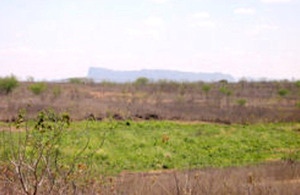DFID Research: Water management in drought-affected North East Brazil
How DFID-funded research is building the capacity of local communities to use land and water more sustainably.

Typical landscape and vegetation of North Eastern Brazil. Picture: Wikimedia Commons
The semi-arid ribbon valleys of North East Brazil have suffered for many years from drought which has affected farmers and domestic water supplies in a poor region already hit by the decline in the local canning industry.
In this environment DFID-funded researchers from Mott MacDonald have demonstrated methods that build the capacity of local communities to use land and water in ways that meet the needs of both agricultural and domestic users. It is hoped that long-term sustainable use of land and water resources will lead to:
- improved social standing of the local communities through empowerment and participation
- reduced vulnerability and better livelihood outcomes through more secure water supply for domestic and agricultural purposes
- reduction of harmful environmental impacts of over-exploitation of the groundwater resource
The state government had previously supported small scale farming through the allocation of land to landless individuals. In the past, irrigation advice about how to combat salinity in the soil had been provided to farmers by state universities in only a small catchment area, the Rosario community. These farmers used the agricultural market in the local town, and only had very limited access to wider markets. Water availability is a major factor in determining the success of local agriculture, but ground and surface water management was effectively absent; during droughts, drinking water was provided by tanker, not from groundwater. Only 1 valley had groundwater dams installed to increase water yields.
Education on water management a key
Education of the local populace about water management and the perils of resource overuse was a key component of the work; researchers and local communities had to learn to work together and consider the seasonal and long-term changes in water availability that affect people in dry areas. The Mimosa Seco and Xukuru communities were among the 5 communities involved. Traditions of social awareness and organisation in these 2 communities were embraced by, and brought benefits to the other communities: conflict resolution between the indigenous Xukuru community, who own the Pao de Açucar Reservoir and the farmers of Campo Alegre downstream, has resulted in them sharing water and actively participating in a Water User Group and the project as a whole. Former animosities between the Pesqueira muncipality and the Xukuru were eased by their participation, stabilising the community as a whole. The principles of the Water User Group are now being integrated into the statutes of 3 of the 5 local communities.
Seu Antonio, a farmer from Mimosa Seco, is a prime example of someone benefitting from the project; by participating he realised that he was a knowledgeable person, contrary to the popular opinion that farmers’ experience and knowledge is small and of low value to the community. Young people too are empowered by education and training in environmental monitoring, which ensures the long-term sustainability of these principles. This benefits a wide range of stakeholders including: the 5 communities; the surrounding municipalities; NGOs and state departments who benefit from exposure to the examples of the project; and the research community locally and internationally.
The future of the project’s principles of water management and community participation is already secure; scaling-up of the education component, to both adult and child, now takes place at the municipal level by inclusion in the school curriculum. Drought-stricken regions elsewhere could benefit from this methodology, and although funding is the largest barrier to uptake, the success of this project has improved the willingness of local NGOs and state government to provide it.
More information
See R4D project record Sustainable use of ground water in the semi-arid ribbon valleys of north-east Brazil